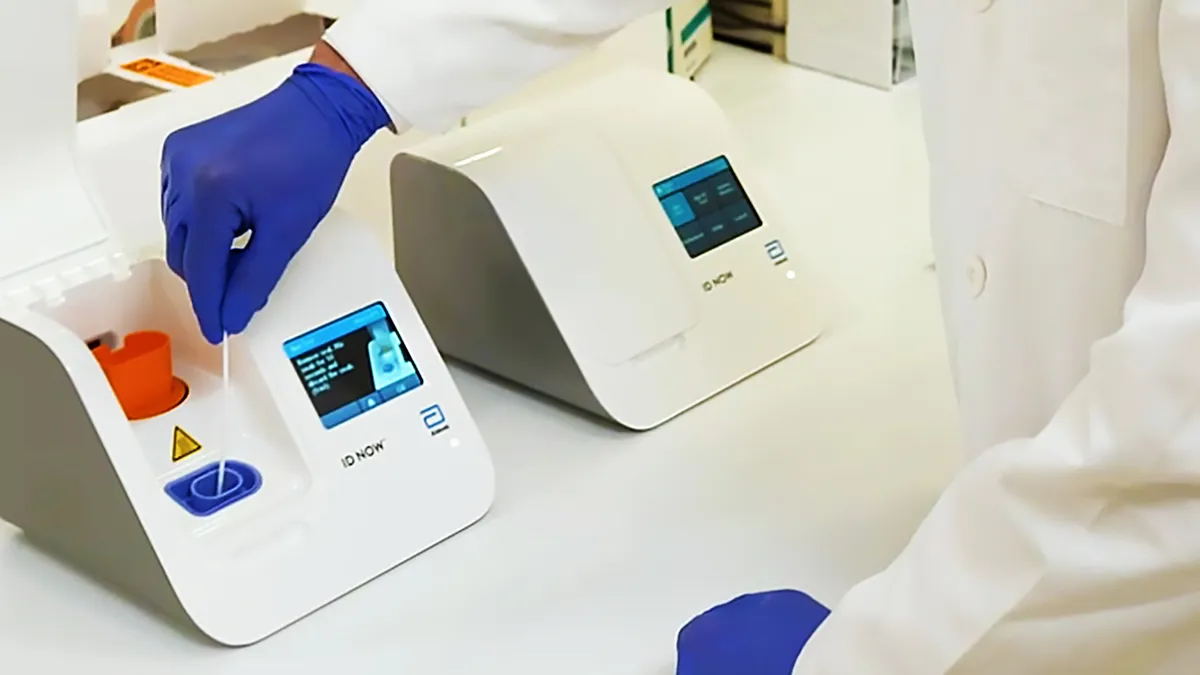Dive Brief:
-
Abbott’s 15-minute, point-of-care ID Now COVID-19 test achieved sensitivity of 93.3% and specificity of 98.4% in a 1,003-subject post-authorization study, the company disclosed in an interim data analysis shared Wednesday.
-
The update comes five months after Abbott agreed to run postmarket trials to allay concerns about the accuracy of the test. FDA took those concerns seriously enough to issue a press release about the evidence in May.
-
Abbott presented the data as a rebuttal to questions about the test but, while most of the data suggest ID Now performs in line with other products, the 79.8% sensitivity seen in one study points to problems when the system is used in certain contexts. Jefferies analysts said in a note Wednesday the Abbott data serves to confirm the primacy of molecular tests.
Dive Insight:
Over the weekend, former FDA head Scott Gottlieb put the accuracy of ID Now back in the spotlight in questioning the White House’s reliance on the Abbott product to test President Donald Trump and members of his administration. Abbott CEO Robert Ford acknowledged that type of public talk in Wednesday's release, stating that his team recognizes “there is a lot of discussion about testing and ID Now.”
Ford contends the data newly shared by the company show ID Now delivers “effective, consistent and reliable performance” that position it to play an important role in the response to COVID-19.
The centerpiece of the data drop is an interim analysis of a post-authorization study that used ID Now to analyze samples taken at urgent care clinics, hospitals and nursing homes. Across the entire set of samples, ID Now achieved sensitivity of 93.3% and specificity of 98.4%. An earlier, separate PCR meta-analysis linked that slower, standard approach to an average sensitivity of 98%.
ID Now performed better in certain subsets of patients. Applied to samples taken within seven days of the onset of symptoms, ID Now had a sensitivity of 95.0% and specificity of 97.9%. Similar results were achieved in the subset of symptomatic patients. Abbott used the data to argue there is a role for its rapid ID NOW test in the diagnosis of COVID-19.
Abbott also shared an update on three other studies already underway when FDA issued a notice about the accuracy of ID Now in May. The data from studies that assessed ID Now in a multi-site urgent care clinical setting and at the The Everett Clinic in Washington are roughly in line with results from the post-authorization study.
The outlier is a study that used ID Now to analyze samples from symptomatic patients at hospitals and nursing homes. In that study, ID Now achieved sensitivity of 79.8% and specificity of 94.3% compared to lab-based molecular PCR tests.
The low sensitivity may reflect the study population. Most of the samples came from people who presented with symptoms more than seven days ago. In a subset of samples taken within seven days of the onset of symptoms, sensitivity was 86.7%.
Overall, the sets of data singled out by Abbott suggest ID Now accurately diagnoses most patients correctly. The speed of the test makes it attractive in some contexts, although the false negative rate seen in the studies may support criticism of the White House’s reliance on ID Now to stop infected people coming into contact with the president.
The prioritization of testing speed in some contexts is reflected in demand for Abbott’s rapid antigen test, which came to market months after ID Now. On Tuesday, Canada signed an agreement to buy 20.5 million of Abbott’s Panbio COVID-19 antigen rapid tests.











